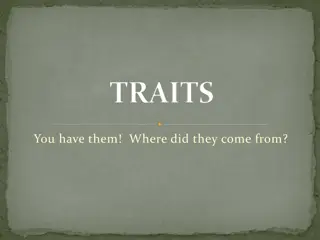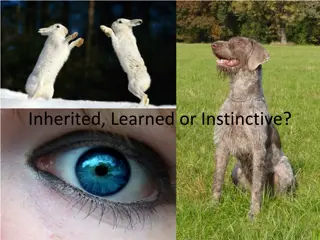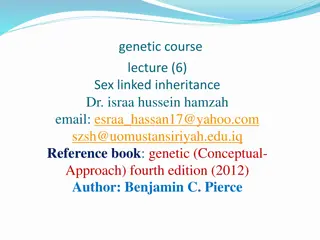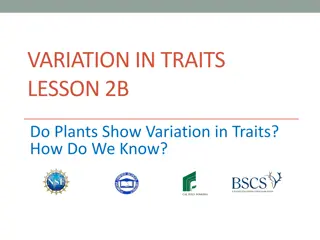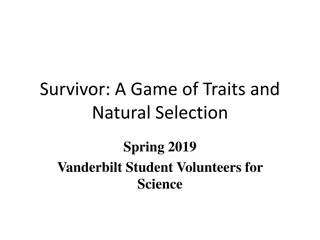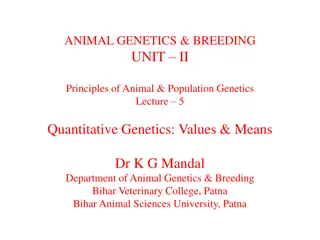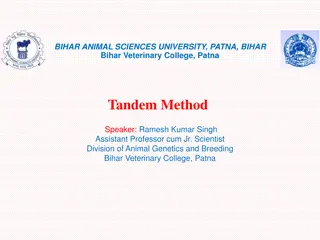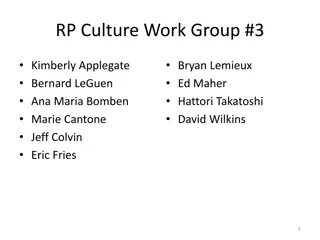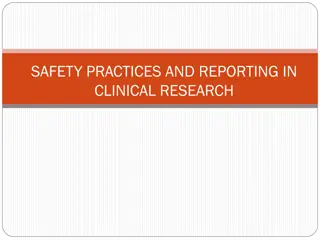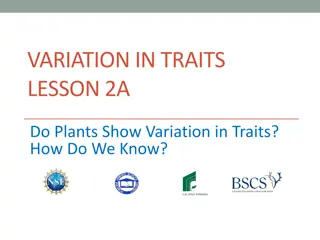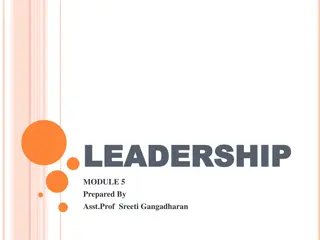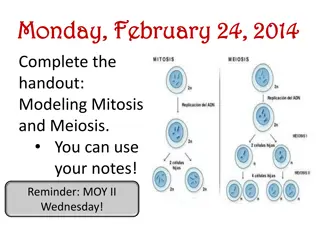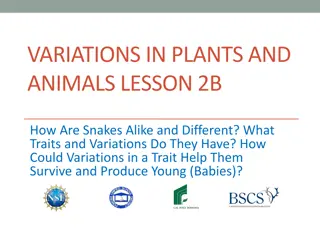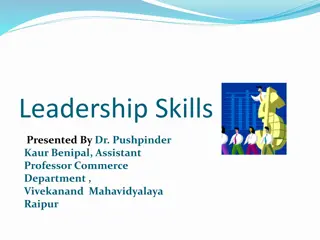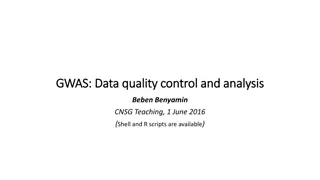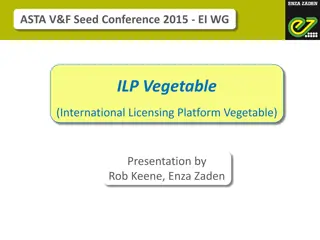FACILITY MANAGEMENT & SAFETY
Facility management and safety are interlinked disciplines crucial for optimizing workflow and ensuring a safe environment in various facilities. This includes managing space, infrastructure, resources, and staff effectively. Specific focus on laboratory facility management involves maintaining qual
3 views • 19 slides
Safety Health and Welfare.
The Campus Safety, Health, and Welfare (SHW) Committee at TU Dublin is vital for ensuring a safe and healthy environment for all members. Led by Edel Niland, the Senior Manager, the committee focuses on various aspects such as safety arrangements, committee structure, team organization, and safety t
3 views • 21 slides
Enhancing Safety: People Power SafetySTEP Refresher Training
Explore the comprehensive SafetySTEP Refresher Training program aimed at achieving safety through employee participation, engagement, and proactive safety measures. This training emphasizes creating a culture where safety is a core value, utilizing leading indicators to measure safety successes, and
0 views • 65 slides
Unraveling the Mystery of Traits and Genes
Explore the fascinating world of traits and genes, understanding how they are passed down from parent to offspring through chromosomes. Delve into the role of genes in controlling various traits such as hair color, eye color, and even unique characteristics like detached earlobes and widow's peak. D
0 views • 11 slides
Understanding Cultural Traits and Complexes in Society
Culture is a complex whole that encompasses various aspects such as knowledge, beliefs, arts, morals, laws, customs, and more. Cultural traits, at the simplest level, are individual tools, acts, objects, or beliefs related to specific situations or needs, while cultural complexes are groups of inter
0 views • 18 slides
Understanding Inherited, Learned, and Instinctive Traits in Organisms
Traits in organisms can be inherited, learned, or instinctive. Inherited traits are genetic and include characteristics like hair color and disease predispositions. Instinctive traits are inherent behaviors such as sleeping and grooming. Learned traits are behaviors acquired for survival, like house
0 views • 20 slides
Understanding Sex-Linked Inheritance: Key Concepts and Examples
Sex-linked inheritance refers to the transmission of genetic traits determined by genes located on the sex chromosomes. This type of inheritance differs from autosomal inheritance due to the unique characteristics of the X and Y chromosomes. In organisms with XX/XY sex determination, genes on the X
1 views • 21 slides
Exploring Plant Traits: Do Plants Exhibit Variation in Traits?
Discover in this lesson whether plants display variations in traits through the measurement of plant lengths. Students analyze data tables of carrots and leaves to observe trait variations and discuss patterns found in bar graphs and data tables. The focus is on understanding how to identify and int
0 views • 11 slides
Exploring Leadership Theories: Traits and Behaviors
Leadership theories have evolved from trait theory focusing on personal qualities to behavioral theories emphasizing actions and interactions. While early research sought universal traits for leadership, it encountered challenges due to varied traits among leaders and non-leaders. Behavioral theorie
2 views • 29 slides
National Mine Safety Week 2023 - Vehicle Safety Guidelines
Explore the comprehensive safety guidelines for vehicle operation during National Mine Safety Week 2023. Learn about maintaining safety equipment, cabin safety systems, visibility safety systems, operational safety systems, emergency safety systems, other safety systems, training responsibilities, a
1 views • 10 slides
Contrasting Qualitative and Quantitative Traits in Genetics
Genetic traits in organisms can be qualitative or quantitative, with qualitative traits controlled by single genes and showing distinct variations, while quantitative traits are influenced by multiple genes and environmental factors, resulting in continuous variations. Qualitative genetics focuses o
0 views • 13 slides
Understanding Personality Traits and Assessments
Psychologists utilize traits to describe personality, addressing common misunderstandings about introversion and exploring the strengths and weaknesses of personality inventories. The consistency of personality traits over time and across situations is examined, along with the identification of insi
0 views • 38 slides
Explore the Science of Natural Selection and Traits
Dive into the fascinating world of natural selection and traits with a focus on how organisms adapt to their environments. Learn about the importance of Charles Darwin's theories, the role of traits influenced by genes and the environment, and how natural selection drives the survival of the fittest
4 views • 13 slides
Understanding Acquired Traits and Learned Behaviors in Living Organisms
Acquired traits are physical characteristics acquired during a living thing's lifetime, such as scars, and are not passed down from parents. Many acquired traits are also learned behaviors, like reading or flying, which animals develop after birth. Learned behaviors, unlike inherited instincts, are
5 views • 15 slides
Understanding Quantitative Genetics Principles in Animal Breeding
Quantitative genetics focuses on the inheritance of characteristics based on degree rather than kind, compared to qualitative genetics. It involves polygenes controlling quantitative traits, which exhibit continuous variation and can be measured using metric units. Qualitative traits, on the other h
0 views • 22 slides
Comparative Analysis of Aviation Safety Management Systems: MSG-3 vs. SMS
The aviation industry continuously strives to enhance safety, leading to the development of Safety Management Systems (SMS) by ICAO and the longstanding Maintenance Steering Group (MSG-3) program. These systems focus on improving safety through different approaches, with MSG-3 emphasizing engineerin
1 views • 25 slides
Tandem Method in Animal Breeding: Sequential Traits Selection
Tandem method in animal breeding involves selecting useful traits sequentially to improve genetic performance. Breeders focus on one trait until a desired level is achieved before moving on to the next trait. While effective in targeted improvement, the method can lead to loss of previously improved
0 views • 6 slides
Proactive Safety Measures: PDO Safety Stand Down April 2024
A Safety Stand Down is a crucial activity to proactively discuss safety with employees, emphasizing risk awareness and injury prevention. The incident involving a fatal injury during Rig Move activities serves as a catalyst for reflection and improvement regarding safety procedures. This guide provi
1 views • 4 slides
Neutrino Platform Hall Access and Safety Guidelines
Guidelines for accessing and ensuring safety within the Neutrino Platform Hall at CERN, including registration, permissions, safety trainings, required equipment, online trainings, access points, and safety team responsibilities. Access is granted through registration at CERN, completion of safety t
1 views • 7 slides
Importance of Safety Education for Graduate and Undergraduate Students
Graduate and undergraduate students often lack safety knowledge and ethics, emphasizing the need for safety education over mere training. Safety education builds critical thinking, promotes safety ethics, and prepares individuals to handle future safety issues. Incorporating safety teachings through
3 views • 11 slides
Exploring Ancestry and Traits Through SNPedia and PCA Analysis
Delve into the world of genetics and ancestry analysis through SNPedia, a comprehensive resource for Single Nucleotide Polymorphisms (SNPs) information. Discover how Principle Component Analysis (PCA) simplifies genetic data to reveal insights into ancestry, traits, and informative SNPs. Explore exa
0 views • 33 slides
Elements of RP Culture and Proposed Safety Traits
This presentation delves into the important elements of RP culture, criteria for success, stakeholder engagement, the role of RP professionals, and the inclusion of regional culture. It also highlights commonalities in knowledge, leadership, behavior, and action across disciplines. Additionally, it
0 views • 14 slides
Understanding Genotype and Phenotype in Hereditary Traits
Exploring simple heredity through predicting and modeling phenotypes of Crazy Creatures, students are tasked with contrasting genotype and phenotype. The Crazy Traits lab data table is essential for recording alleles and genotypes, aiding in determining phenotypes for 14 different traits. By complet
0 views • 4 slides
NUSSC 57th Meeting - End of Term Report & Safety Standards Update
The 57th Meeting of the Nuclear Safety Standards Committee (NUSSC) concluded its 9th term with significant achievements including the approval and publication of multiple safety standards. Key highlights include the development of new standards such as SSG-3, SSG-88, SSG-89, and SSG-90 focusing on v
0 views • 8 slides
Safety Practices and Reporting in Clinical Research
Safety practices and reporting in clinical research are crucial for ensuring the rights, safety, and well-being of trial subjects. This includes monitoring safety, reporting adverse events promptly, and following regulatory requirements. Investigators play a vital role in assuring subject safety and
0 views • 33 slides
Understanding Objective Personality Tests and Traits
Explore various objective personality tests and traits, including examples of uni-dimensional traits such as Locus of Control, Type A/B personalities, Tolerance for Ambiguity, Need for Cognition, Bem Sex-Role Inventory, and more. Delve into the concepts introduced by psychologists like Julian Rotter
0 views • 14 slides
Understanding Genetics and Evolution through Traits and Adaptation
Exploring concepts like traits, mutations, adaptations, and genetic changes in organisms to comprehend what makes individuals unique and how species evolve and adapt over time. The content delves into the inheritance of traits, the role of DNA segments, and distinguishing characteristics in living b
0 views • 29 slides
Safety Clearance Procedure for NA62: Overview and Recommendations
The conventional safety clearance procedure for NA62 involves checks by DGS-SEE (HSE) and obtaining radiological safety clearance from the DGS/RP group. Various safety checks are outlined in memorandums by Mark Hatch and Jonathan Gulley. Safety files for NA62 are noted to be in poor states, lacking
0 views • 8 slides
Exploring Personality Development and Traits
Understanding the importance of personality development, this presentation by Dr. Rani Sarode delves into the various aspects that define an individual's character and behavior. It discusses the significance of traits like communication skills, interpersonal relationships, attitude towards life, and
0 views • 24 slides
All About Team Building, Teamwork, and Leadership Traits
Explore the importance of team building, teamwork, and essential leadership traits. Learn about the purpose of a team, the need for teams in companies, forming effective teams, and the character traits that contribute to team success. Discover roles and responsibilities within a team to enhance coop
0 views • 33 slides
Exploring Plant Traits: Understanding Variation in Characteristics
Delve into the world of plant traits and variation in this interactive lesson. Discover how plants exhibit different traits and explore the concept of variation within species. Engage in investigations, measurements, and discussions to deepen your understanding of plant characteristics. Uncover the
0 views • 12 slides
Leadership Insights: Traits, Differences, and Framework
Leadership involves guiding others towards shared goals through vision, inspiration, knowledge, and resilience. It distinguishes from management in focus and approach. Analyzing leadership involves assessing leader traits, situational factors, and follower dynamics. The leadership framework comprise
0 views • 36 slides
Understanding Genetics: Mendel's Experiments and Inheritance Patterns
Delve into the world of genetics through Mendel's groundbreaking experiments with pea plants, exploring traits inheritance, Punnett squares, dominant and recessive alleles, incomplete dominance, and co-dominance. Gain insights into how traits are passed from parents to offspring and predict offsprin
0 views • 9 slides
Exploring Snake Traits and Variations
Delve into the world of snakes to understand their shared traits and diverse variations. Discover how these variations in traits help snakes survive and reproduce, offering insights into their unique characteristics and evolutionary advantages.
0 views • 14 slides
Unveiling Leadership Traits and Emotions Through Your Journey
Explore the essence of leadership traits and emotions in a visually captivating journey that delves into understanding and mastering the intricacies of leadership. From uncovering your unique traits to navigating through team dynamics, this collection of images offers insights to enhance your leader
0 views • 12 slides
Leadership Skills Overview: Traits, Theories, and Development
Explore leadership skills presented by Dr. Pushpinder Kaur Benipal, covering traits like adaptability, decisiveness, and social skills. Delve into early and functional leadership theories, understanding the importance of behavior over traits. Develop your own leadership potential with insights into
0 views • 15 slides
Understanding GWAS: A Brief Overview of Genetic Association Studies
GWAS, or Genome-Wide Association Studies, are a method used to map genes associated with traits or diseases by analyzing genetic markers throughout the genome. This process involves statistically testing the association between SNPs and traits using regression or chi-squared tests in a hypothesis-fr
0 views • 19 slides
ASTA.V&F Seed Conference 2015 - EI WG: Advancing Global Access to Plant Breeding Traits
The ASTA.V&F Seed Conference 2015 - EI WG focused on the launch of the International Licensing Platform Vegetable (ILP Vegetable) to enhance global accessibility to plant breeding traits. Discussions revolved around patents' impact on innovation, with 11 prominent companies collaborating to establis
0 views • 18 slides
Gregor Mendel: The Father of Genetics and His Pea Plant Experiments
Gregor Mendel, an Austrian botanist monk, laid the foundation for the study of heredity with his groundbreaking work on pea plants in the mid-1800s. By observing traits across generations, Mendel formulated the basic laws of genetics, demonstrating how traits are inherited. His experiments with pure
0 views • 18 slides
Understanding Personality and Self-Esteem: Exploring Traits and Mental Health
Exploring personality traits, self-esteem, and mental health through definitions, group activities, and descriptions of extroverts, introverts, optimists, pessimists, and realists. The content covers creating lists of personality traits, identifying assertive behaviors, and outlining objectives rela
0 views • 68 slides



